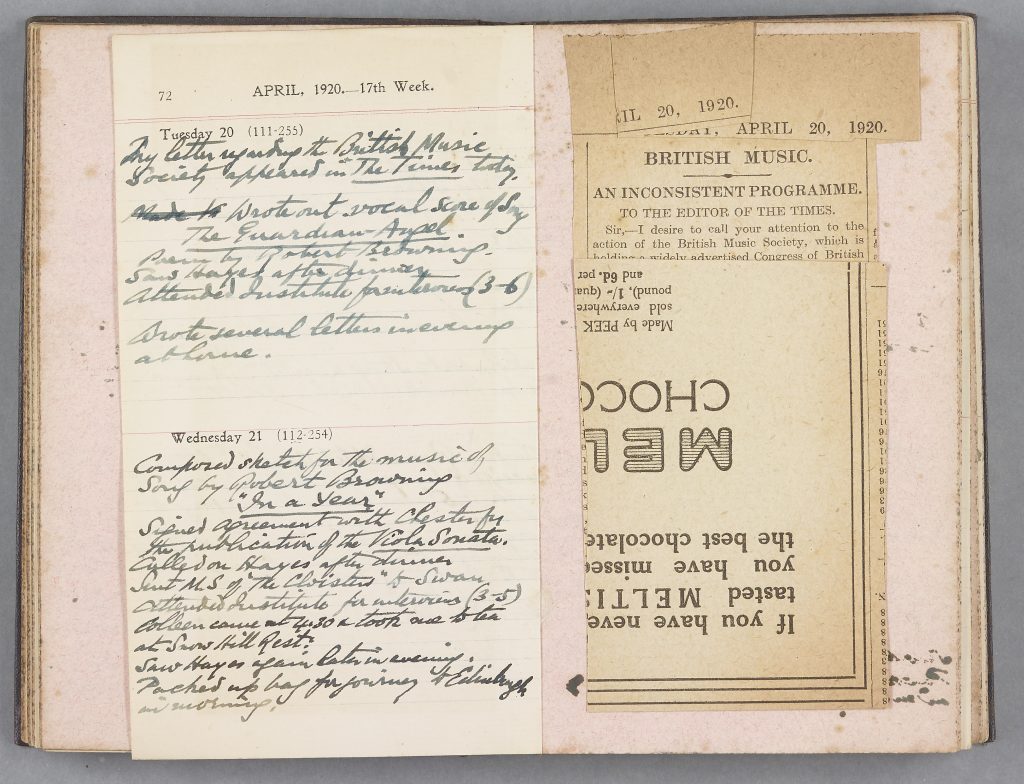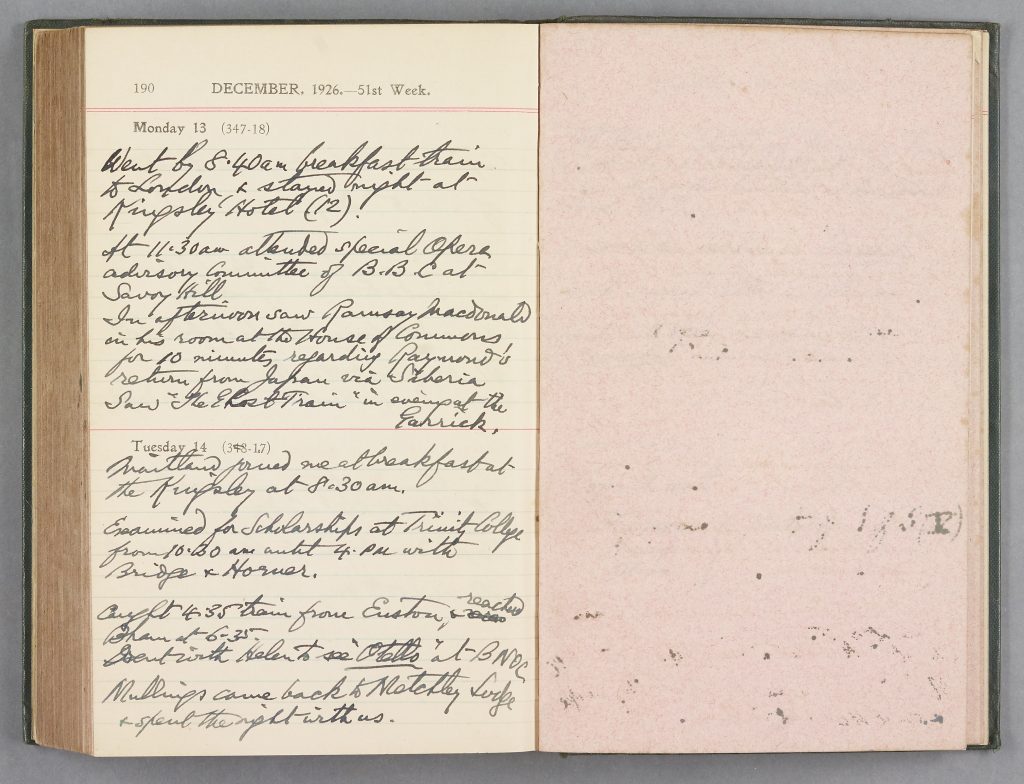The Granville Bantock Diaries: 1920 – 1927
- 20th April 2023
A recently catalogued collection of 37 handwritten diaries belonging to the composer Sir Granville Ransome Bantock shed insight into his life and music. Those written between 1920 and 1927 are the focus of this blog. Past and future posts cover the years 1911 – 1919 and 1928 – 1946.
Musically, the 1920s represent Granville Bantock’s most productive period as a composer. He wrote over 120 works, the subjects of which reflected his diverse interests. His intense affection for poetry, enthusiasm for Chinese and Greek texts, and appreciation for Shakespeare were big inspirations during a time in which an increasingly busy work schedule saw him travel worldwide.
Bantock’s diaries collectively highlight reading as a prominent pastime in the Bantock household. Those between 1920 and 1927 often include lists of books he read or lent during the year. He also records writing music to poems by his wife Helena, daughter Myrrha and son Raymond Bantock. In 1926, he composed the music for a new production of Macbeth – a play he had great affection for, not least, perhaps, because it chimed with his love of Scotland and the Hebrides. Bantock appears to have held Macbeth in high regard where following its run at the Princes Theatre, he picked it for several subsequent broadcasts and concerts. His biggest literary inspiration, however, was arguably the work of Robert Browning. Though this is perhaps unsurprising given his 1912 orchestral drama Fifine at the Fair was based on Browning’s poem of the same name, and his son Raymond’s middle name is Robert, after the poet.
While Bantock’s admiration for Browning was not unique – his poems and plays were popular with many late-nineteenth and early-twentieth century composers – in 1920 he wrote fifteen songs to his texts. His 1920 and 1921 diaries detail the compositional progress of his ‘Browning Songs’ and Dramatic Lyrics – a work set to a collection of poems by Browning with the same name. The latter, Bantock records beginning in April 1920 and culminating in a recital given by the opera singer (and Bantock’s friend) Frank Mullings in 1921. Fans of Bantock’s music will also note performances of some of his most famous works – Hebridean Symphony and Omar Khayyam among them.

A letter Bantock wrote to the editor of The Times, titled British Music. An Inconsistent Programme, Diary of Granville Bantock, 1920: 705:462 BA16022/10
Bantock’s diaries during this period offer great insight into his friendships and professional relationships. His interactions with Mullings are well documented. In a rare admission of opinion, Bantock refers to Mullings’ first performance of his Four Pagan Chants in 1926 as a ‘superb performance’ in which ‘he (Mullings) was wonderful’. Bantock’s friendship with Alfred Hayes – also on the staff at The Birmingham and Midland Institute – remains, and he continues to spend time with Aubrey de Sélincourt, Donald Tovey and Sir Edward Elgar – at one point dining with Elgar before going to a concert together. The English theatre director Sir Barry Jackson, born in Kings Norton, Worcestershire, is another notable acquaintance.
Those familiar with European classical music will also note his meetings with contemporaries including Jean Sibelius, Hamilton Hartey and Joseph Holbrooke. Holbrooke was seemingly one of Bantock’s closest friends and is first mentioned in his 1924 diary. Bantock also records spending time with British bass singer Robert Radford who, on the 8th of September, sang with an orchestra two of his songs at an evening concert in Worcester. In 1926, he meets renowned writer W.B. Yeats and the dramatist Lennox Robinson whilst at the theatre in Dublin. He also sees and spends time with then Labour Party leader Ramsey MacDonald – the man he would later vote for as a committed socialist.
The nature of Bantock’s relationship with MacDonald is unclear from the diaries alone, but we can speculate from his 1926 entries that it involved his son Raymond’s return home from Japan. Bantock’s interest and involvement in politics is evident throughout his diaries. In 1921 he attended a speech by the then Liberal prime minister David Lloyd George. He also notes the declaration and termination of the 1926 ‘General Strike’ – a historic walk out by British workers and trade unionists that lasted nine days.

Diary of Granville Bantock, 1920: 705:462 BA16022/16
As the years progress, Bantock begins to provide fuller accounts of his oversees travels and busy work schedule as an adjudicator and examiner. In 1923, he travelled to Canada via America to adjudicate at musical competition festivals – a movement he mentions writing an article on whilst in Quebec. Bantock’s diary for this year solely covers this trip; he details his daily activities, social engagements and the development of his compositions. By 1927, Bantock’s entries regularly record his travel schedule to regional and national festivals both at home and abroad.
From 1928 onwards Bantock’s diaries are very complete, though they are more abrupt and written with greater formality. Next week, we’ll cover his life lived during The Second World War, his continued musical accomplishments, political pursuits and frequent changes of residence before settling in Worcestershire, where he lived until his death in 1946. Tune in then!
The Granville Bantock Diaries are available to research. Please submit an enquiry at ArchiveEnquiry (worcestershire.gov.uk) or speak to someone on the desk if you would like to enquire about viewing these records. Transcriptions of many but not all are accessible on CD in our Self-Service Area.
I would like to access the diaries as Sir Granville Bantock is associated with the school I run.
Thank you
Sally Eaton
Langley Hall Primary Academy.
Thank you Sally. We will add your query to our online system and we aim to respond within 7 working days.